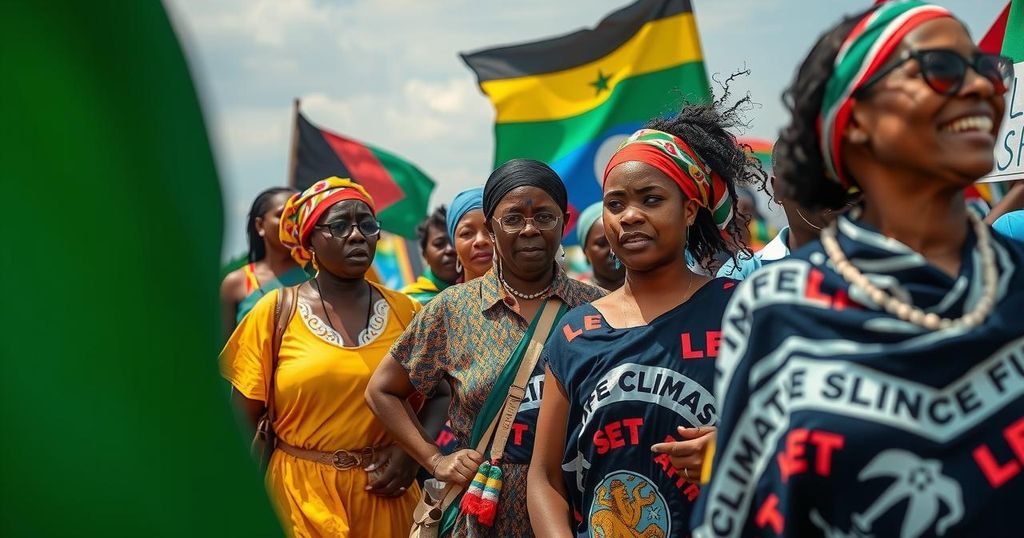Senegalese Women Demand Climate Justice Ahead of COP29
Senegalese women marched in Dakar on Saturday, demanding climate justice and accountability from polluting countries ahead of COP29. They highlighted the adverse effects of climate change in Senegal, particularly recent flooding, and called for adherence to the Paris Agreement and reparations for affected communities.
On Saturday, around 50 women climate activists convened in Dakar, Senegal, to advocate for climate justice as part of their annual march, a tradition that has been observed since 2021. The event, notably significant this year leading up to the 2024 UN Climate Change Conference (COP29), aimed to hold what the participants refer to as “polluting countries” accountable for greenhouse gas emissions. Carrying signs and chanting their demands, the activists urged for the protection of Senegal’s natural resources and the establishment of a sustainable, decarbonized future. Cheikh Niange Faye, a former tour guide from Thiès, expressed frustration over the lack of meaningful action despite their continued protests, stating, “It’s been four years that we’ve been marching, and nothing’s changed. They’re spending billions to do their conferences, but they owe us billions in compensation.” This sentiment resonates deeply as many in the rural communities of Senegal have recently experienced severe flooding, exacerbating the already challenging conditions faced by these populations. This year’s unprecedented floods in the Sahel region affected tens of thousands and destroyed over 1,000 hectares of crops in northern and eastern Senegal, as reported by the government. Activists argue that emitting nations owe African countries reparations for the climate-related adversities they endure, highlighting that Africa contributes only 3.8% to global greenhouse gas emissions. Khady Camara, the chief organizer of the march in Dakar, called for adherence to the Paris Agreement ahead of COP29, stressing the importance of international cooperation on climate issues. Notably, Khady Faye, an environmental activist hailing from the vulnerable Saloum Delta region, urged for an introspective view regarding the impact of new offshore drilling activities on local communities. Faye remarked, “Think about the suffering of these communities, think about the suffering of these women. Try to leave our delta alone, try to leave the gas at Sangomar underground, to let the community live normally.”
The march conducted by Senegalese women serves as a poignant reminder of the intersection of gender issues and climate justice. Women, particularly in rural areas of Senegal, are disproportionately affected by climate change, facing challenges such as food insecurity and displacement due to extreme weather events. Conversely, the industrialized nations continue to contribute significantly to greenhouse gas emissions, creating a widening gap in accountability. The call for reparations underscores how developing nations, despite their minimal carbon footprint, are heavily impacted by the actions of those countries predominantly responsible for climate change, prompting a demand for systemic change ahead of major climate conferences.
In conclusion, the march in Dakar highlighted the urgent calls by Senegalese women for accountability from polluting countries regarding their harmful emissions and their effects on vulnerable communities in Africa. The participants emphasized the need for reparative action and adherence to international agreements aimed at combating climate change. As climate events continue to devastate their livelihoods, the activists’ message serves as an urgent call for justice and protection of the environment.
Original Source: abcnews.go.com




Post Comment